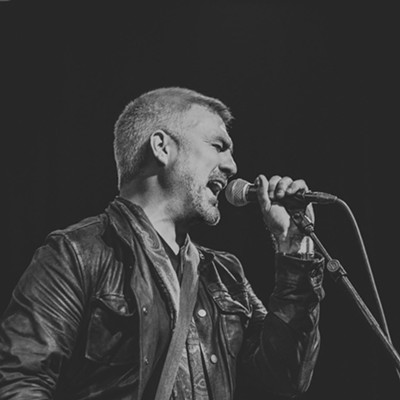Las Vegas rapper Dizzy Wright's 2015 album, The Growing Process, couldn't be titled more literally. Though it's not short on boasts—Wright states he's at his pinnacle on the jazzy "Explain Myself"—the album is chiefly concerned with Wright figuring out exactly what he wants to accomplish, musically, lyrically and artistically.
"I'm still learning a lot about myself as an artist," he says over the phone from his place in Vegas. The album caps off a busy couple of years for the 25-year-old, who went from stints on 106 & Park in 2010 to signing with Funk Volume a year later, releasing his debut SmokeOut Conversations in 2012.
Wright grew up in Las Vegas, a town not known for its hip-hop scene. "We don't have any famous rappers from here," he says. "I'm probably the biggest that it gets as far as hip hop. I'm trying to pave the way for artists to do their thing, be creative in a cool way. I feel like I'm helping shape the culture here."
Without venues to play, Wright's style developed in conjunction with house parties, where he'd freestyle. "I always [listened to] a wide range of music because Vegas is a party city, so growing up it was all about parties," Wright says, citing artists like 2Pac, Biggie, Jay-Z, Nelly and Nas. "That's the kind of music you really enjoyed, the music that made you dance and have fun."
You can hear the influence of those shows in the record, with its jazzy flow, a few trunk rattlers and mellow beats. You can also hear Wright's biggest influence, Bone Thugs-n-Harmony, sonically, in his loose melodies, and also literally: Layzie Bone guests on "Regardless" and Krayzie Bone appears on "Don't Ever Forget."
"I grew up on Bone Thugs," Wright says.
While the record stays in a laid-back lane musically, Wright's lyrical range is deft, waxing about politics on "God Bless America" with Big K.R.I.T. and Tech N9ne, philosophy on "Can I Feel This Way" and image on "Floyd 'Money' Mayweather." He sums up his approach on the album's final song, "Will It Last": "I'm just trying to balance out what I'm rapping about."
"I like to talk shit, but I like to have my wisdom in there," Wright says. "I like to speak my real game. I don't like to shove the message down people's throats, but I want people to know there is a message."
Sometimes the message is bleak, like when Wright shifts uncomfortably toward victim shaming—citing Bill Cosby's public fall from grace—on "False Reality," but mostly he raps from the perspective of a family man, seeking to better understand his own message and ethos.
"I have to try and set that example and be okay with making mistakes," Wright says. "I'm not going to do everything right, I'm not going to be positive all the time, but I have to at least try. I know that if I'm going through life at least trying—knowing that some people can see that—then I'm good."







